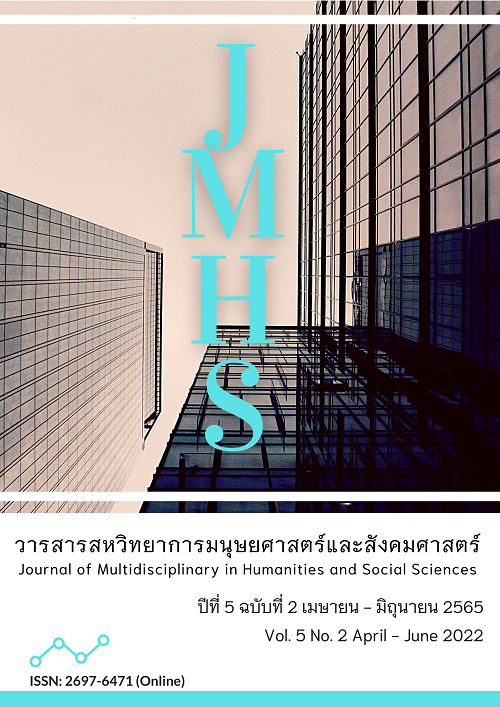การพัฒนาหลักสูตรพหุวิทยาการและรูปแบบการจัดการเรียนรู้ภูมิปัญญาท้องถิ่นด้านอาชีพเชิงรุกเพื่อส่งเสริมทักษะอาชีพและการเรียนรู้เชิงผลิตภาพของผู้เรียนในจังหวัดกาญจนบุรี
Main Article Content
บทคัดย่อ
บทความนี้มีวัตถุประสงค์เพื่อ 1) พัฒนาครูให้มีความสามารถพัฒนาหลักสูตรพหุวิทยาการและรูปแบบการจัดการเรียนรู้ภูมิปัญญาท้องถิ่นด้านอาชีพเชิงรุก 2) ทดลองใช้หลักสูตรพหุวิทยาการและรูปแบบการจัดการเรียนรู้ภูมิปัญญาท้องถิ่นด้านอาชีพเชิงรุก และ 3) ประเมินความพึงพอใจและถอดบทเรียนกลไกความสำเร็จ ใช้ระเบียบวิธีการวิจัยและพัฒนา เก็บรวบรวมข้อมูลจากผู้บริหาร ครู และนักเรียน โรงเรียนนำร่องเขตพื้นที่นวัตกรรมการศึกษาจังหวัดกาญจนบุรีที่เข้าร่วมการพัฒนาสู่การเป็นโรงเรียนต้นแบบจำนวน 3 โรงเรียน เครื่องมือที่ใช้ในการวิจัย ได้แก่ เครื่องมือเชิงปริมาณและเชิงคุณภาพที่ผ่านการหาคุณภาพตามเกณฑ์ ผลการวิจัยพบว่า
1. ผลของการพัฒนาครูให้มีความสามารถพัฒนาหลักสูตรพหุวิทยาการและรูปแบบการจัดการเรียนรู้ภูมิปัญญาท้องถิ่นด้านอาชีพเชิงรุก จากผลการประเมินความรู้ความเข้าใจและทักษะของครูผู้เข้ารับการอบรมตามหลักสูตรพบว่า ภาพรวมอยู่ในระดับมาd
2. คะแนนเฉลี่ยระดับการรับรู้ทักษะอาชีพของนักเรียนหลังเรียน สูงขึ้นกว่าก่อนเรียน และแตกต่างอย่างมีนัยสำคัญทางสถิติที่ระดับ .05 และผลผลการประเมินทักษะอาชีพและการเรียนรู้เชิงผลิตภาพของนักเรียนโดยครูพบว่า ภาพรวมอยู่ในระดับมาก
3. ความพึงพอใจของนักเรียนที่มีต่อการใช้หลักสูตรและรูปแบบการจัดการเรียนรู้ในภาพรวมผลการประเมินอยู่ในระดับมาก ผลการถอดบทเรียน พบว่า การพัฒนาครูให้มีความสามารถพัฒนาหลักสูตรพหุวิทยาการและรูปแบบการจัดการเรียนรู้ภูมิปัญญาท้องถิ่นด้านอาชีพ เป็นรูปแบบที่เรียกว่า 4 ส ประกอบด้วย 1) การสร้างเสริมสัมพันธภาพ 2) การสนับสนุนเติมเต็ม 3) การสร้างสรรค์หลักสูตรและการจัดการเรียนรู้ และ 4) การสะท้อนความสำเร็จ
Article Details

อนุญาตภายใต้เงื่อนไข Creative Commons Attribution-NonCommercial-NoDerivatives 4.0 International License.
ทัศนะและความคิดเห็นที่ปรากฏในวารสาร ถือเป็นความรับผิดชอบของผู้เขียนบทความนั้น และไม่ถือเป็นทัศนะและความรับผิดชอบของกองบรรณาธิการ
เอกสารอ้างอิง
ชนาธิป พรกุล. (2561). กระบวนการสร้างความรู้ของครูกรณีการสอนบูรณาการ. กรุงเทพฯ: จุฬาลงกรณ์มหาวิทยาลัย.
ดวงเดือน อ่อนน่วม และ ทิศนา แขมมณี. (2548). การจัดการเรียนรู้แบบบูรณาการองค์ความรู้จากการวิจัยและพัฒนาเพื่อปฏิรูปการเรียนรู้ทั้งโรงเรียน. กรุงเทพฯ: สถาบันพัฒนาคุณภาพวิชาการ.
ปรณัฐ กิจรุ่งเรือง. (2553). การพัฒนารูปแบบการสอนโดยใช้กรณีศึกษาทางศาสตร์การสอนเพื่อส่งเสริมความสามารถด้านการคิดอย่างมีวิจารณญาณของนักศึกษาวิชาชีพครู(วิทยานิพนธ์ดุษฎีบัณฑิต). มหาวิทยาลัยศิลปากร.
เปรมฤดี บุโรทกานนท์ และ คณะ. (2556). การศึกษาการนำแหล่งเรียนรู้และภูมิปัญญาท้องถิ่นมาใช้ในการจัดการเรียนการสอนของโรงเรียนสมุทรสงคราม. วารสารบัณฑิตศึกษา มหาวิทยาลัยราชภัฏวไลยอลงกรณ์, 7(1), 159-168.
พระราชบัญญัติพื้นที่นวัตกรรมการศึกษา พ.ศ. 2562. (2562, เมษายน 30). ราชกิจจานุเบกษา. เล่ม 136 ตอนที่ 56 ก. หน้า 102–120.
พิริยะ ผลพิรุฬห์ และ ปังปอน์ รักอำนวยกิจ. (2558). ทุนมนุษย์กับผลิตภาพแรงงานในภาค อุตสาหกรรมไทย. กรุงเทพฯ: สำนักงานกองทุนสนับสนุนการวิจัย.
ไพฑูรย์ สินลารัตน์. (2560). ก่อนถึงโรงเรียน 4.0: โรงเรียนสร้างสรรค์. (พิมพ์ครั้งที่ 2). กรุงเทพฯ: โรงพิมพ์แห่งจุฬาลงกรณ์มหาวิทยาลัย.
ไพฑูรย์ สินลารัตน์ และ คณะ. (2563). การศึกษา 4.0 เป็นยิ่งกว่าการศึกษา. กรุงเทพฯ: โรงพิมพ์แห่งจุฬาลงกรณ์มหาวิทยาลัย.
วัชรา เล่าเรียนดี, ปรณัฐ กิจรุ่งเรือง และ อรพิณ ศิริสัมพันธ์. (2560). กลยุทธ์การจัดการเรียนรู้เชิงรุกเพื่อพัฒนาทักษะการคิดและยกระดับคุณภาพการศึกษา. นครปฐม: เพชรเกษมการพิมพ์.
สิทธิณัฐ ประพุทธนิติสาร. (2552). การวิจัยเชิงปฏิบัติการแบบมีส่วนร่วม: แนวคิดและแนวปฏิบัติ. (พิมพ์ครั้งที่ 4). เชียงใหม่: วนิดาการพิมพ์.
สุรางค์ โคว้ตระกูล. (2552). จิตวิทยาการศึกษา. กรุงเทพฯ: สำนักพิมพ์จุฬาลงกรณ์มหาวิทยาลัย.
สำนักงานพัฒนาเศรษฐกิจและสังคมแห่งชาติ. (2559). แผนพัฒนาเศรษฐกิจและสังคมแห่งชาติ ฉบับที่ 12 พ.ศ. 2560 – 2564. กรุงเทพฯ: สำนักงานคณะกรรมการการพัฒนาเศรษฐกิจและสังคมแห่งชาติ.
สำนักงานเขตพื้นที่การศึกษาประถมศึกษากาญจนบุรี เขต 4. (2557). แผนปฏิบัติการประจำปี 2557. กาญจนบุรี: กลุ่มนโยบายและแผน.
สำนักงานเลขาธิการสภาการศึกษา. (2560). รายงานการสังเคราะห์ตัวชี้วัดด้านการศึกษาไทย ตามกรอบเป้าหมายการพัฒนาที่ยั่งยืน. กรุงเทพฯ: สำนักงานเลขาธิการสภาการศึกษา.
สำนักงานเลขาธิการสภาการศึกษา. (2560). แผนการศึกษาแห่งชาติ พ.ศ. 2560-2579. กรุงเทพฯ: สำนักงานเลขาธิการสภาการศึกษา.
สำนักงานเลขาธิการสภาการศึกษา. (2562). รายงานพันธกิจปฏิรูปการศึกษาไทยของคณะกรรมการอิสระเพื่อการปฏิรูปการศึกษา. สืบค้นเมื่อ 1 กรกฏาคม 2564, จาก http://backoffice.once. go.th>Book>1734filepdf.
สำนักงานเลขาธิการสภาการศึกษา. (2563). แนวทางการนำมาตรฐานการศึกษาของชาติสู่การปฏิบัติ. กรุงเทพฯ: สำนักมาตรฐานการศึกษาและพัฒนาการเรียนรู้.
เอกชัย แสงอินทร์. (2559). อภิธานศัพท์. จุลสาร ส.ค.บ.ท., 13(2), 4.
Beetham, H., & Sharpe, R. (2007). Rethinking Pedagogy for a Digital Age. New York: Routledge.
Caine, R.N., & Caine, G. (2010). Strengthening and Enriching Your Professional Learning Community: The Art of Learning Together. Alexandria: ASCD.
Hall, P. et al. (2016). The Principle Influence. Alexandria: ASCD.
Joyce, B., & Weil, M. (2009). Models of Teaching. (8th ed.). New Jersey: Prentice-Hall.
Meyer, C., & Jones T. B. (1993). Promoting Active Learning, Strategies for the College Classroom. San Francisco: Jossey-Bass.
Oliva, P. F. (2009). Developing the Curriculum. (7th ed.). Boston: Allyn and Bacon.
Partnership for 21st Century Learning. (2015). P21 Framework Definitions. Retrieved from www.porg/storage/documents/docs/P1_Framework_Definitions_New_Logo_2015.pdf.
Sato, M. (2016). Enhancing Collaborative Learning: Challenges of School as Learning Community. In The 9th Annual Congress for Teacher Professional Development EDUCA 2016. (October 12-13). Bangkok, Thailand.
Sunal, D. W., & Sunal, S. C. (2002). Science in the Elementary and Middle School. New Jersey: Pearson Education.
Tileston, D. W. (2007). Teaching Strategies for Active Learning: Five Essentials for Your Teaching Plan. California: Corwin Press.
Trilling, B., & Fadel, C. (2009). 21st Century Skills: Learning for Life in Our Time. U.S.A.: Jossey-Bass.
White, A. (2004). The Lesson Study Approach to Implementing Change, Paper Presented at SEAMEO-UNESCO Education Congress and EXPO Secretarial, Bangkok Thailand. Retrieved from http://www.Seameo-unesco.org/fullpaper/MMMI/101/FP.doc.


